
Discourse in Parliament: German Parties & Big Tech
PDF Version: Click here
Suggested Citation: Renz/Kuhlmann/Frenken/Walter, DKartJ 2023, 43
On 26 May 2023, competition law was once again a topic in the German Bundestag: The Parliament held the first reading of the planned reform of the Act against Restraints of Competition (GWB). The Bundeskartellamt, the national competition agency, is to receive extended powers – we reported. This upcoming 11th amendment is an occasion to look back at the last debates in parliament. Four students of Heinrich Heine University have done just that: they have – in a project with Prof. Dr. Heiko Beyer – looked at the debates in the Bundestag in the 19th and 20th legislative periods from a sociological perspective. They have summarised their findings for the readership of D’Kart. Here are the insights of Julius Renz, Fiene Kuhlmann, Nick Frenken and Darius Walter.
Debates on digital capitalism
The public is wrestling with the challenges and concerns of digital capitalism. But how does “the legislator” assess the actions and monopoly position of the tech giants? In a discourse analysis according to the paradigm of the sociology of knowledge, the speeches of two Bundestag debates were analysed over a year. All parties represented in the 19th and 20th legislative periods were considered. The results paint a first picture of how the parliamentary parties assess and evaluate the new phenomenon of the platform economy, which is summarised under the keyword “digital capitalism”. It can be seen that there is an increasing and sometimes strong deviation from the ‘classic’ ideologies of the parties.
Ideology in this context refers to the way knowledge and thinking are constituted in a society. In this example, ideologies are manifested by the carriers of ideology in the form of political parties. They take different perspectives on economic contexts and evaluate them. This results in different ideologically shaped explanations for the same phenomenon, digital capitalism. These are outlined below. It should be noted that ideologies change and adapt over time, especially in parliamentary democracies, where the respective party system can result in convergence through institutional pressure.
SPD: Competition as the highest good
In their speeches, the MPs of the Social Democratic Party (SPD) emphasise two aspects in particular. On the one hand, it is about the network effects that come about through the extraordinary position of the big tech giants. It is only through Facebook’s dominant position and its Messenger services, most of which have no alternatives, that they can bind customers to themselves. On smaller platforms, they do not have the same networking possibilities as with the established provider. At the same time, however, the self-portrayal and lack of problem awareness of the big tech giants is criticised, as Facebook, for example, repeatedly emphasises that its own market power is not that great and that it leaves room for other providers.
The second and more dominant aspect, which runs like a thread through the speeches of the SPD and especially that of MP Falko Mohrs, who has a speech in both sessions, is the emphasis on competition. In addition to the importance of the idea of competition in the market economy, its significance for everyday life is also emphasised:
“Competition really is a central building block. It has a central function for the way we do business, the way we live, the way we work, precisely because it promotes innovation, precisely because it ensures that the one who stretches himself furthest, who is particularly motivated to go ahead, also – hopefully – makes the best offer. That is one of the core elements of our economic system” (Falko Mohrs).
Consequently, competition must also be created. However, this should not primarily result from curtailing the power of the big tech companies, but from strengthening potential competitors. However, the SPD largely fails to answer the question of how exactly small players can compensate for the often technical know-how of the big players and their existing data advantage.
Speakers for SPD: Falko Mohrs, Jens Zimmermann (2018), Johannes Arlt, Falko Mohrs (2022)
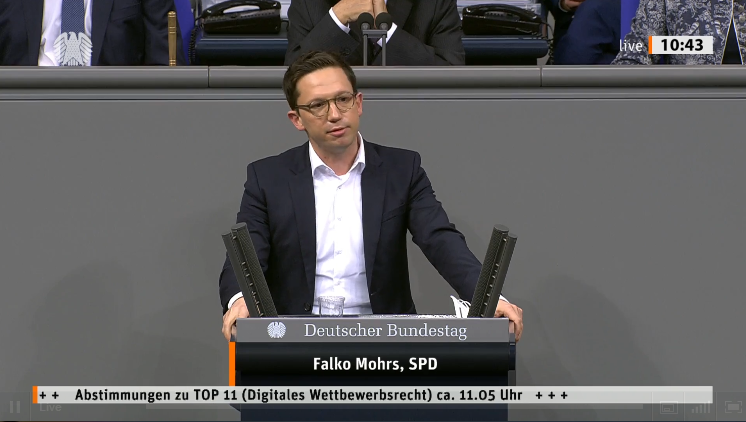
CDU/CSU: Everything remains the same
The CDU/CSU (Christian Democrat Union/Christian Social Union, the conservative party) also recognises the problem that a few large companies can endanger competition in the market. However, in their speeches they very often refer to already existing instruments that they adopted during their time in government to ensure the framework conditions for fair opportunities for all market participants. For example, Axel Knoerig refersto the Monopolies Commission, to a working paper of the Bundeskartellamt from 2016 called “Market Power of Platforms and Networks” and the 9th amendment of the GWB. From the point of view of the CDU/CSU speakers, sufficient instruments are already available, which only need sufficient time to take effect. They also cite the example that an investigation has already been initiated against Facebook. That is why they are clearly against stricter rules, such as an abuse-independent unbundling option, at least as proposed by the Greens in 2018.
But the speakers from the CDU/CSU parliamentary group also made it clear that competition is a great good and essential for the market. However, it must not happen that customers have to experience disadvantages due to too much regulation. The special problems of digital capitalism and the challenges that go along with it are seen as special only to a limited extent. Thus, familiar mechanisms and instruments are to be used above all. Reference is made to past regulations and reforms in the areas of logistics, telecommunications and postal services.
Speakers for CDU/CSU: Axel Knoerig, Hansjörg Durz (2018), Hansjörg Durz, Thomas Heilmann (2022)
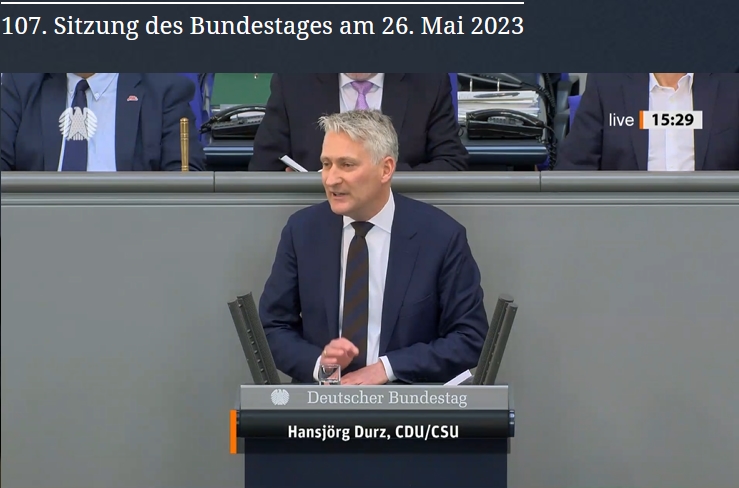
ALLIANCE 90/THE GREENS: Green flag in the wind
In their speeches of 2018, the MPs of the Green party primarily discuss the market power of corporations. In their reception, this primarily represents an obstacle to competition. Monopolisation leads to the largest companies being able to concentrate market power. This has consequences above all for competition:
“This [market power] makes it impossible for many companies to compete with such corporations. We have markets here that already tend to monopolise by themselves” (Katharina Dröge).
Four years later and involved in government, there is talk of “big companies managing to keep smaller ones out of the market because of their market power”. However, the diagnosis is much more optimistic:
“With the Digital Markets Act, the EU is finally putting a long overdue stop to the market dominance of Google and Co in the EU” (Maik Außendorf).
The Digital Markets Act (DMA) is “a good basis for limiting the market power of online giants and ensuring a fair and consumer-friendly internet”. Monopolisation is thus basically seen as a problem for consumers, not necessarily as a macroeconomic challenge that has to address economic power. Closely linked to the problem of monopolisation, the Greens criticise the lack of competition that goes along with it. In 2018, Katharina Dröge put forwardthe thesis:
“There are markets that are so bequeathed that there is no way to establish fair competition” (Katharina Dröge).
However, this actually again very fundamental critique of digital capitalism, which functions through bequeathed and proprietary markets, only translates into demands of the party in 2018.
In the 2022 debate, this problem is described as follows:
“Currently, a few big platforms and tech players are preventing alternative business models, including those of smaller and medium-sized companies”(Maik Außendorf).
The problem is no longer the market itself, but individual companies with a lot of power in this market. In terms of rhetoric and content, this is clearly more restrained than in the previous legislative period. With regard to Section 19a of the GWB, which the CDU/CSU emphasises, the Greens, like the SPD before them, refer to the coalition agreement of the current government of SPD, Greens and liberals, i.e. the objectives that they themselves have adopted. The CDU/CSU refers to the previous legislative period in which it governed together with the SPD.
Speakers for the Greens: Katharina Dröge (2018), Maik Außendorf (2022)
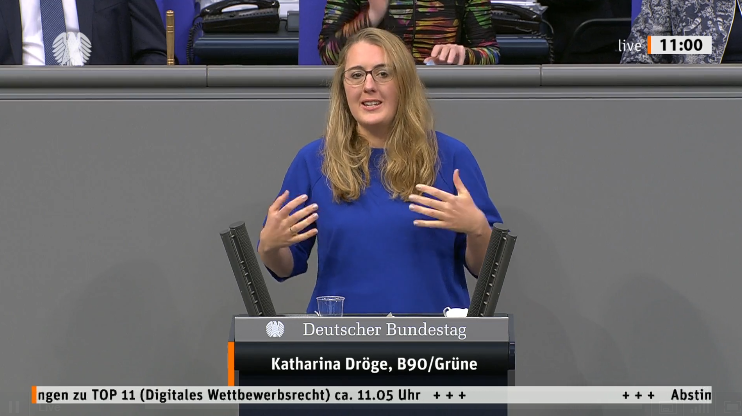
FDP: Liberalism in a Dilemma
The FDP parliamentary group (Free Democrats, the liberals) basically considers monopolisation tendencies of some service providers rather unproblematic, but a change in argumentation from its time in opposition to its participation in the current government can be discerned. Following its traditional market liberalism, it does not want to set a hasty political course, especially in its role as an opposition party, but wants to let the market regulate itself. Although it has previously emphasised that it does not reject regulatory measures per se, the almost unrestricted trust in the ability of the market to regulate itself, on which players like Google, Apple, Facebook and Amazon operate, seems surprising.
In 2022, under the pressure of coalition mechanisms, then the change: the FDP warns against the increasing dominance of digital platforms, saying they are a danger to fair competition, but also to democracy. Whereas four years earlier the role of the state was still desired to be as passive as possible, now it is defined as a “strong arbiter”. In the speeches analysed, the parliamentary group does not come up with any concrete ideas, but criticises that the barriers to entry in the digital economy are too high for potential competitors.
Speakers for FDP: Reinhard Houben (2018), Nicole Bauer (2022)
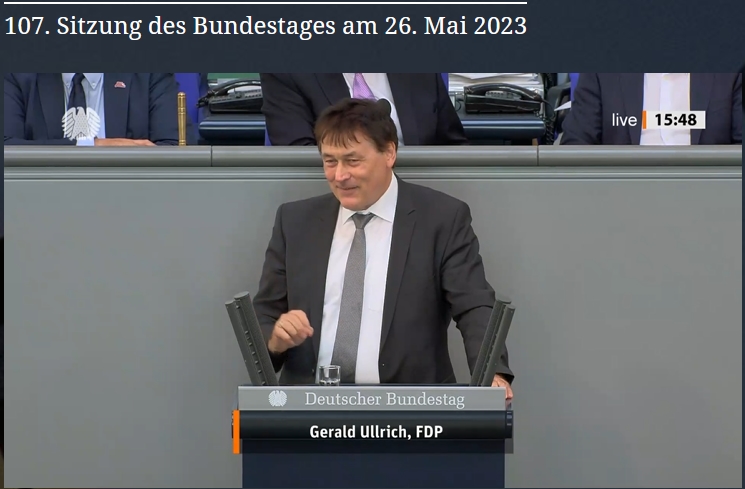
The Left: Change the System? No!
The Left Party, too, primarily addresses the monopolising tendencies of digital capitalism. This is to be expected from the party’s well-known position. What is interesting here is their explicit reference to the Bundeskartellamt, an institution that is supposed to enable competition in a largely free market:
“The Bundeskartellamt has already certified that the company has a dominant market position” (Anke Domscheit-Berg).
There is no further reference to the socialist character of the Left Party, which actually advocates the socialisation of large companies. For the Left, it is above all important to emphasise that “monopolies tend to abuse their market power and are dangerous for this reason”. The fundamental monopoly tendency of capitalism is emphasised here. Based on the problem of monopolisation, the Left also sees a lack of competition and distortions of competition as a problem. This is therefore rather unexpected, since a party that sees itself as socialist uses market-liberal, i.e. competition-oriented argumentation at this point. Just like the reference to the Bundeskartellamt, this also shows a lack of orientation in the assessment of recent economic developments. Instead of outlining an alternative to the free market, the lack of it is seen as a problem. The “dangerous concentration of power in the large digital corporations Amazon, Google and Co.” is emphasised again and again, but the specific problems of digital markets are neglected. The party most likely to be expected to question the market as an economic institution joins the other parties here. A socialisation perspective, as the Left Party sees it, at least on paper, for banks and other large corporations, does not emerge for the leading companies of digital capitalism. Change the system? No!
Speakers for the Left Party: Anke Domscheit-Berg (2018), Pascal Meiser (2022)
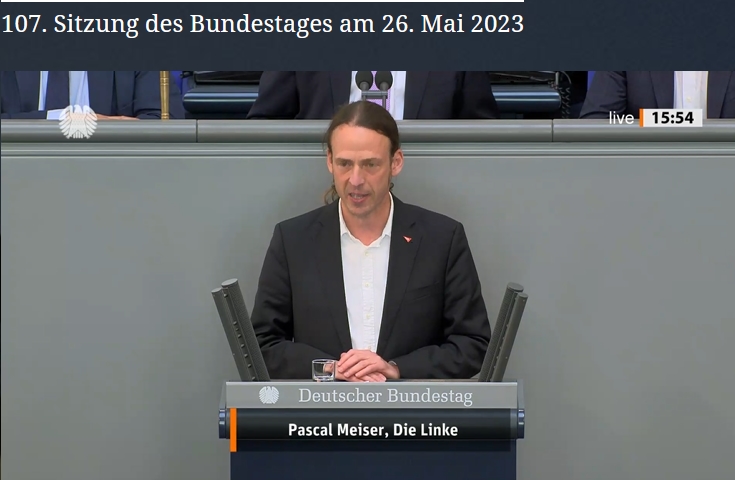
AfD: Against it on principle
The AfD (Alternative for Germany, the right-wing populist party) seems to have an ambivalent relationship to issues of monopolisation and market regulation. Even in a market where only a few players have power and influence, competition is possible, the group argues in 2018, the reason being the high pressure to innovate, especially in the digital sector. The speaker’s argumentations that Microsoft and Apple, after all, also failed to see some developments and fell behind, raise many questions in the matter.
In 2022, the argumentation structure changes. This time the focus is on small and medium-sized enterprises, which have no chance against the giants Amazon and Co. However, the criticism seems to be primarily directed against the federal government’s Corona protection measures, when “nonsensical” 2G and 3G regulations are blamed for the poor economic situation. State regulations are thus in principle already conceivable, but please within the framework, which for the AfD means neither falling into “green-socialist planned dreams” nor “neoliberal market Darwinism”.
Speakers for AfD: Enrico Komning (2018), Malte Kaufmann (2022)
Summary
Looking at the two debates in the Bundestag in 2018 and 2022, a few things become crystal-clear. All parties, from the Left to the AfD, are in absolute agreement that competition is the building block for a functioning economic system. This must be created, for some parties through significantly stronger state intervention. For others the state should only create the most necessary framework conditions. We see that the SPD and the CDU/CSU are not making any major changes of position over time. Both want to strengthen competition and refer to instruments that they have introduced and that need time to take effect. The Left and the AfD also largely stick to their positions. The latter unsurprisingly criticises the government and the Corona measures, while the Left argues almost market-liberal and almost completely abandons its once socialist claim. The Greens and the FDP, on the other hand, are more interesting: Both parties are much sharper in their arguments in 2018, when they are in opposition. The FDP remains true to its market-liberal principles and defends them, while the Greens call for unbundling without abuse and advocate strong intervention. Four years later, little of this can be heard. Both parties become much more moderate and move closer to their coalition partner.

Almost all parties also agree that the European level is actually the more suitable place to regulate the big tech players. Only the AfD dissents and prefers to bundle competences at the national level.
When dealing with digital capitalism, all parties show clear criticism of the strong position of individual companies. The awareness of the problem varies in terms of depth. There is a certain reluctance on the part of all parties towards more radical reforms; instead, solutions are sought or further developed within the existing framework, also with reference to the high reputation of the Bundeskartellamt. Competition should not be created primarily by reducing the size of large companies, but by potential competitors breaking up these monopolies in a competitive struggle. Whether these can stand a chance against the market power, the technical know-how and the financial means, however, remains questionable – and is not further discussed in the Bundestag.
Sources:
Stenographic reports
German Bundestag (ed.). (2018). Fair digital markets – ensuring competition and data protection. Stenographic report 29th session. Plenary Minutes 19/29. item 12, 2732 C – 2744 B. Available at: https://dserver.bundestag.de/btp/19/19029.pdf#P.2732.
German Bundestag (ed.). (2022). The market power of tech giants – making the social market economy fit for the digital age. Stenographic report 18th session. Plenary Minutes 20/18. item 25, 1327 B – 1334 B. Available at: https://dserver.bundestag.de/btp/20/20018.pdf#P.1327.
A report on the session of the German Bundestag on the 11th GWB amendment is available here.

Julius Renz, Fiene Kuhlmann and Nick Frenken (left to right) are students in the Master’s programme in Social Sciences at Heinrich Heine University Düsseldorf. They are happy to provide further information. The entire 80-page project paper can be requested from team (at) d-kart.de.
The co-author Darius Walter (right) was their fellow student. He passed away unexpectedly in May 2023. This sad news reached us shortly before the planned publication of this article. “The visible has passed away, only love and memory remain,” wrote Darius’ family. In this respect, the publication is also a contribution to remember Darius Walter.